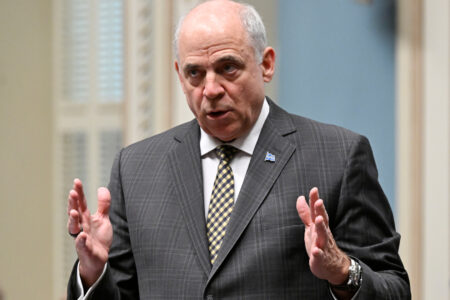
The time is ripe to revisit Section 23 of the Canadian Charter of Rights and Freedoms, which guarantees minority-language educational rights. Section 23 is at odds de facto with the Trudeau government’s Bill C-13, an Act to Amend the Official Languages Act, which was introduced in March, as well as the government’s intention to hopefully stem the decline of French outside Quebec.
In its current form, Section 23 of the Charter ill-serves the interests of francophones outside Quebec and unnecessarily pits francophones in and outside Quebec against each other. It needs to be amended.
As an economist by training with a background in demography, I approach Section 23 from a social-science perspective. Its interpretation has evolved over time as the courts have moved to increasingly broad readings of the prerogatives of minority-language school boards (Mahé vs Alberta and Conseil scolaire francophone de la Colombie‑Britannique vs. B.C.). This is a welcome evolution; however, my focus is on the impact of Section 23 on the future of French outside Quebec.
Politically defined rights
Section 23’s two key clauses (with some editing) read as follows:
Citizens of Canada
(a) whose first language learned and still understood is that of the English or French linguistic minority population of the province in which they reside, or
(b) who have received their primary school instruction in Canada in English or French and reside in a province where the language in which they received that instruction is the language of the English or French linguistic minority population
have the right (where numbers warrant) to have their children receive primary and secondary school instruction in the minority language (English in Quebec, French outside) of the province in which they reside.
Contrary to popular perception, there is no freedom of choice for schooling in French outside Quebec. Paragraph (b) is essentially a clone of Quebec’s Bill 101, which limits access to English schools in the province to students whose parents received their primary school instruction in English in Canada. Paragraph (b) imposes an analogous restriction outside Quebec. Non-francophones and non-citizens (that is, the vast majority of Canadians outside Quebec) do not have the right to send their children to French schools. Upon reading paragraph (b), one might wonder what the outcry against Bill 101 was all about. If Bill 101 is discriminatory, then the Charter is equally so. The emergence and increased use by non-francophone parents of French immersion programs for their children is only a partial means of getting around this restriction.
Is modernizing the Official Languages Act a mission impossible?
In accordance with Section 59 of the Charter, paragraph (a) of Section 23 is not operative in Quebec to ensure that it does not collide with Bill 101, but it remains useful outside Quebec because many francophones will not have had the opportunity to receive early schooling in French. This is a legacy of the dismal record of French schooling in many provinces, including the sad history of Manitoba’s and Ontario’s notorious anti-French laws – a different experience compared to that of anglophones in Quebec. Anglo-Quebecers never needed to fight for the right to English (or Protestant until recently) schools, which have been available since Confederation.
False equality
We come here to what I call Section 23’s original sin: the implicit premise of equality of circumstances of Canada’s two language minorities. Equality of treatment is a core principle (a priori entirely noble) of the Charter, transposed here to language rights. However, the reader will hopefully forgive me for turning to Aristotle’s well-known aphorism: “Trying to make unequal things equal is the worst form of inequality.” Simply, applying the principle of legal equality to Canada’s two official language minorities is an error and contrary to the sociological facts.
The courts have in part acknowledged this inequality, as does Bill C-13, which reflects the concept of substantive equality introduced in the Trudeau government’s 2021 white paper. However, for education, the courts have limited the notion of substantive equality to the quality of schooling available to minority-language students, which must be substantively equal to that received by the majority (Conseil vs. B.C.). This seems fairly self-evident. More important, however, for the future of French outside Quebec is the definition of who (“rights-holders”) has the right to instruction in the minority language.
The “equal” definition of rights-holders (i.e., for English schools in Quebec and French outside) as stipulated in paragraph (b) is a perfect example of Aristotle’s aphorism. In Quebec, the legal restrictions on English schooling for immigrants (and native francophones) are deemed necessary to protect the French language in the province. Prior to Bill 101 in 1977, more than 90 per cent of immigrant children frequented English schools, posing a perceived long-term threat to the language balance in Quebec, especially in Montreal.
No equivalent rationale underlies the restriction to French schooling outside Quebec. English does not need to be protected. There is no need to compel immigrants and native anglophones to send their children to English schools. This takes us back to the fundamental inequality between the two languages: their respective power to retain native speakers and attract newcomers. In the simplest terms, more than 40 per cent of francophones outside Quebec no longer speak their mother tongue at home and allophone immigrants outside Quebec almost universally adopt English as their home language over time.
The (false) perception that freedom of choice exists outside Quebec is easy to understand. English is the natural choice, period; the legal barrier to French schooling is thus not perceived as the denial of a right.
The only parents who have freedom of choice under paragraph (b) are Quebec anglophones, who can also send their offspring to French schools if they wish, and francophones outside Quebec, who remain free to enrol their children in English schools, which many do although that is often a first step to language loss. However, language maintenance is only half the story. Newcomers to Quebec are required to adopt French because the province’s government sees immigration as an increasingly vital component of population growth, as it is in the rest of Canada.
Strengthening French language laws in Canada: Three major legislative initiatives
Modernization of Official Languages Act impacts all Canadians
Immigration is also a core component of the federal government’s strategy to stem the decline of French outside Quebec.
Page 15 of the 2021 white paper states: “The Government is counting on Francophone immigration to reverse this worrisome trend.” Bill C-13 in turn promises: “The Minister of Citizenship and Immigration shall adopt a policy on francophone immigration to enhance the vitality of French linguistic minority communities.”
Am I the only person to see a contradiction between Section 23 and the government’s intentions?
Ethnic straitjacket
Section 23, it is important to reaffirm, constitutes a historic victory for francophones outside Quebec, repairing a historical wrong. Some 160,000 students are today enrolled in primary and secondary French schools outside Quebec – a situation impossible to imagine without Section 23. Many will go on to live active lives in French and transmit the language to their children. But this historic triumph does not alter Section 23’s essentially ethnic definition of rights-holders.
Contrary to Quebec’s Bill 101, which forces immigrants into the francophone fold, Section 23 confines francophones outside Quebec to an ethnic self-definition. It allows francophones to educate their children in French and to transmit their culture – a historic gain – but leaves no room for the integration of newcomers, nor does it prevent francophones from sending their children to English schools.
The result is predictable. The combined impact of low birth rates (like all Canadians), attrition (francophones choosing English), plus the absence of new blood through immigration means that francophones, as a proportion of the population outside Quebec, will continue to shrink – a mathematical inevitability.
The obvious solution, at least for immigration, is: (1) to replace the citizenship requirement in paragraph (b) with a permanent residency requirement and (2) to open the French primary schooling option to immigrants from all nations or at least to all immigrants who are former residents of nations where French is an administrative language. This is not terribly complicated. So why not do it?
Here we collide with the other face of Aristotle’s aphorism: because the two minorities are in principle entitled to equal treatment, what is given to one must also be given to the other. This has engendered the absurdity where the government of Quebec finds itself arguing in Yukon Francophone School Board, Education Area #23 v. Yukon, for example, against granting local French school boards broader powers for fear that it would it find itself saddled with equivalent obligations to Quebec’s English schools.
Were the solution I propose on the table, the reaction of Quebec’s English schools is predictable: we want the same right to enrol anglophone immigrants. Equally predictably, Quebec would oppose any such a reform.
The path out of this catch-22 is no less obvious. Section 23 should include an interpretation paragraph cancelling the equivalency between minority-language educational rights in and outside Quebec, specifically the definition of rights-holders. Section 59 cancelling Section 23(a) in Quebec was a first step. It’s time to complete the decoupling.
This would still not solve the problem of attrition through language abandonment. I do not see any province outside Quebec limiting access to English schools. But it would at least allow French schools that so wished to openly recruit immigrants, and would give the courts ample leeway to assess the specific needs of French-minority schools. Some francophone school boards have chosen to circumvent Section 23, enrolling immigrants (B.C., for example), but this remains an ad hoc solution, open to challenges, and not the same thing as a recognized right.









